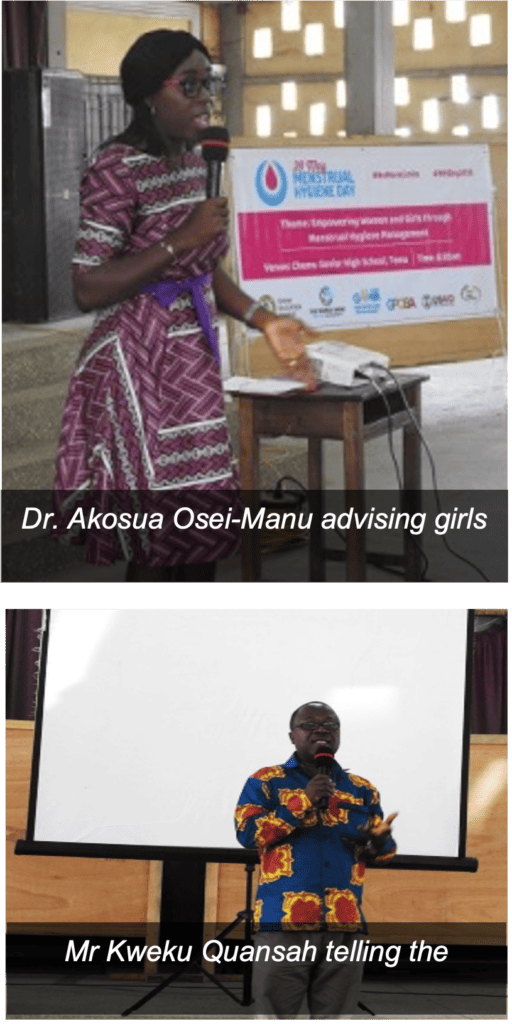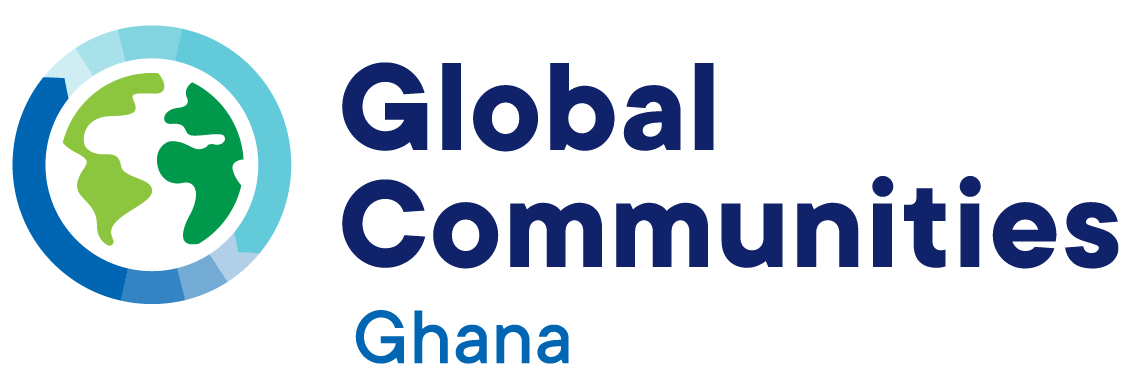News > Blog
No More Limits
Published 12/12/2022 by Global Communities
‘Don’t cook when menstruating. Don’t mingle during your period. Stay in the outer room of the house when menstruating. Don’t step out of your secluded zone until your period ends, because for that period you are unclean.’ These are just some of the limitations and myths placed on many Ghanaian adolescent girls and women, leading to low self-esteem and embarrassment which negatively impact their daily lives and future goals. However, that is starting to change, thanks in part to outreach around Menstrual Hygiene Day (MHD). This year’s theme is “NoMoreLimits – Empowering Women and Girls through Menstrual Hygiene Management.” The key message communicated to the girls at the events was to strive to excel academically rather than allow menstruation to impede their academic progress.
Four educational events were held in three regions of Ghana (Greater Accra, Northern and Western) in collaboration with USAID, Global Communities, the Ministry of Sanitation Water Resources, Metropolitan, Municipal and District Assemblies (MMDAs) and Ghana Education Service (GES) to create and build awareness on Menstrual Hygiene Management (MHM).

In Greater Accra, the event was attended by various dignitaries and students in the Tema Metropolitan Area. Dr. Osei Manu from Ghana Health Service, Nana Ogyedom Ama Tsetsewa I, (female) Chief and Osumpahene of Gomoa Akyempim Traditional Area, and Mr. Kweku Quansah of the Ministry of Sanitation and Water Resources, all inspired the girls and boys at the Chemu SHS Assembly Hall with their words of encouragement and commitment.
The biological perspective of menstruation was highlighted by Dr. Osei-Manu, who reinforced the importance of hydration. “It is important to consume at least three liters of water to prevent dehydration during menstruation since a lot of blood is shed. Also, increase the intake of iron-based meals, such as kontomire (green leaves) stew to prevent anemia,” she explained. She cautioned the girls: “You are still girls and not yet women. Avoid sexual intercourse, which is likely to result in pregnancy. Enjoy your girlhood.” She concluded with encouraging words, cheering on the girls to strive to achieve their goals, just as she has.
“Somewhere in Nakpanduri, girls have to walk several miles to get access to at least 20 liters of water during their period. So on this day, I want you all to think about your colleagues and friends who sacrifice their education when they are menstruating because of one limitation or another,” said Mr. Kweku Quansah.

The title ‘chief’ is usually associated with men, but Nana Ogyedom Ama Tsetsewa I defied the odds and became a female chief. Her informative delivery focused on the gradual transition of the use of traditional red cloth to sanitary pads/panty liners. She also debunked certain myths: “In the olden days, we used the ‘amonsi’ (white-spotted red cloth) and because of the harmful pathogens that could be transferred from the woman as a result of improper hygiene practices to people, they were secluded, not because menstruation is a taboo,” she said.
Nana’s eloquence and personality helped convey the ‘NoMoreLimits’ theme empowering the girls and women present. “When I start my period I will not use t-roll or paper in place of a sanitary pad and I will change my pad regularly to prevent infections and bad odor,” declared Salomey Owusu, a 9-year-old girl who listened intently to all the speakers. Sixteen–year-old Priscilla Essilfie was equipped with new Menstrual Hygiene Management tips from the event. “I flow for only three days and I used to get worried but, today, I have been taught that it is normal,” she said.
Boys are often fond of ridiculing girls during their time of the month, and Nana Kwesi Duodu Agyei was no exception until this MHD-2018. He made two solemn vows that “I will apologize to all the girls in my class I have ever ridiculed and show empathy during the time of the month especially when they are in pain”, he said. He added that, I will now channel my energy into educating my male peers about Menstrual Hygiene Management. Though MHM may be seemingly exclusive to female, males were heavily represented as much as females to better appreciate and support females, and make advocates of them to propagate the ‘No Limit’ message.
“Until today, I had no idea I had to consume iron-based meals and over three liters of water a day, because I lose appetite during my menses. I also didn’t know that the panty liner was used for absorbing the menstrual residue fluids. In fact, more MHM programs should be organized, it is very educational,” said Kate Enu, a parent of an adolescent girl at the school. Not only will Kate educate her daughter on all she learned but she will also practice the lessons learned at home too.

The event at Bole in the Northern region was packed with activities. Approximately 300 pupils and staff from five different schools took to some principal streets of Bole to sensitize women and girls on the importance of MHM and MHD. There were brief interpersonal education sessions with some passers-by and leaflets were also distributed.
To climax the activities of the day, a quiz was conducted on MHM and current affairs. It was held at the Bole Senior High Conference Hall. The competition was witnessed by officials from the Bole District Assembly, Ghana Education Service and Global Communities. Four schools; Bole Methodist, Bole District Authority (D/A), Bole English and Arabic (E/A) and Kurabaso Junior High Schools, participated in the competition.

At the end of the competition, E/A JHS came up tops, Kurabaso JHS and Bole D/A JHS occupied the second and third positions. All three schools were presented with prizes. The first and second schools received a fully stocked First Aid box each, and the third school received a wall clock.
The atmosphere in the Western region was calm. A total of 800 pupils from seven schools participated in the celebrations. Five schools were present at the Kojokrom event, whilst two participated in the Anaji event.
Participants – mainly students and a few parents – were impressed with the insightful comments at the event, and requested that such events be held regularly. By and large the program was a success, thanks to the collaborative effort of Global Communities with support from USAID, the Ministry of Sanitation and Water Resources, MMDAs and GES.
Closely related to Menstrual Hygiene Management is the distribution of the BeGirl sanitary panties to female pupils in selected schools in four regions. The initiative, spearheaded by Global Communities with funding from the American people, USAID, as part of the WASH for Health Project, is currently in its final stages. So far, 1,142 girls have already benefited from this initiative.
